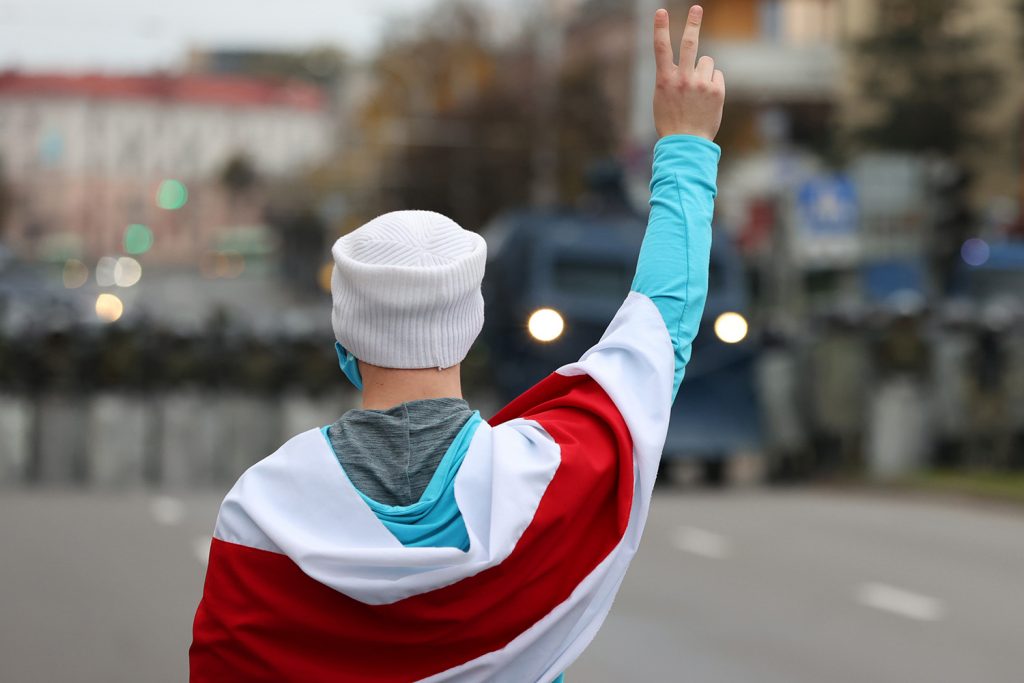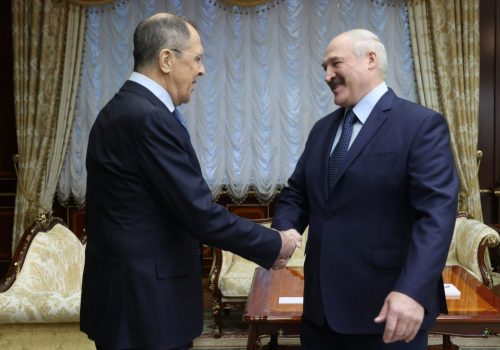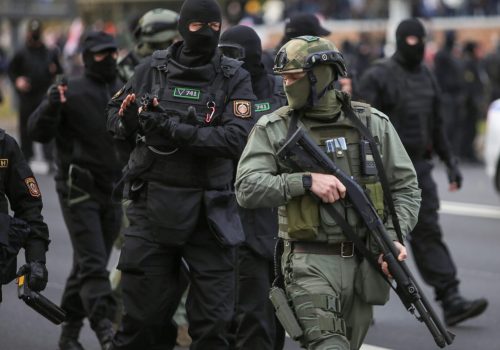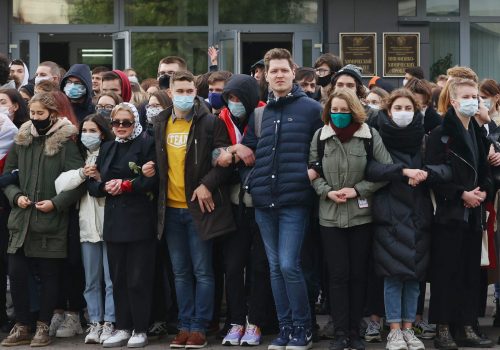Although Belarusian dictator Alyaksandr Lukashenka has resisted calls to relinquish power following a August presidential election tainted by fraud, thousands of Belarusian protesters continue to flood the streets to demand his resignation and new elections. The “people of Belarus have demonstrated amazing determination in the peaceful fight for change,” opposition leader Sviatlana Tsikhanouskaya said on December 7. Despite mass arrests, violence against demonstrators, and allegations of torture, Tsikhanouskaya reported that “Belarusians are prepared to protest as long as it is necessary” to oust Lukashenka. “There is no way back,” she maintained.
But the Belarusian people must not be left to fight against Lukashenka on their own, she argued. Speaking at an Atlantic Council Front Page event, the former presidential candidate and leader of the Belarusian Coordination Council stressed that the Belarusian people “need [the West’s] help now. People are suffering every day now.” Explicit support from Western governments for the Belarusian people and stronger pressure on Lukashenka and his allies will help oust the regime and allow for new elections, she said. “Stay with us and we will win.”
Here’s a quick look at what Tsikhanouskaya thinks the United States and the European Union can do to help the people of Belarus and what she revealed about how the protesters are continuing their struggle:
The fight goes on
- Belarusians will not stop: Although protests in Belarus have lasted nearly four months, Tsikhanouskaya maintained that the resolve of the Belarusian people remains strong. “The Belarusian people will not stop until the president resigns,” she declared, adding that she has “never seen such a level of determination and resilience” among Belarusians as she does now. Tsikhanouskaya ran in the August 2020 election after her husband was arrested in May for attempting to run against Lukashenka. Despite the official results, which have been widely discredited as fraudulent, Tsikhanouskaya has publicly stated her belief that she in fact won the August contest, and has been recognized as the legitimate leader of Belarus by neighboring Lithuania and the European Parliament.
- Repression isn’t working: “The protest mood is so strong that even the brutal beatings and torture” have not dissuaded Belarusians from speaking out, Tsikhanouskaya asserted. She reported that more than 31,000 people have been detained at demonstrations, including 373 journalists. Many of these arrests have been conducted violently, with widespread reports of injuries among protesters. “The Lukashenka regime brutally punishes people for expressing their opinion,” Tsikhanouskaya emphasized, but “this doesn’t stop [the] people from participating in the protests.”
- Focus on human-rights abuses: In addition to the violence that police have engaged in at demonstrations, there are at least 4,000 allegations of torture being made by detainees against the security services, Tsikhanouskaya reported. Despite these claims, she noted that there are no pending legal cases against law enforcement, while more than 900 criminal cases have been opened against political activists. The current Belarusian legal system is “completely dysfunctional” Tsikhanouskaya argued, and activists are now focused on creating a “book of crimes” to document the regime’s human-rights abuses and use “as evidence for future investigations,” she said.
- The next steps: In addition to continuing to exert popular pressure on the regime through demonstrations, Belarus’s pro-democracy activists are turning their attention to the security services. Tsikhanouskaya argued that “the monolith of the security forces [is starting] to break under the pressure of the citizen movement.” Activists are working on winning over security-force members by dispelling pro-regime propaganda and simultaneously are setting up “local decision-making centers” to try to break the central grip of the Lukashenka regime.
How the West can help
- Support matters: Tsikhanouskaya credited strong Western reactions to the fraudulent elections in August with helping sustain the protest movement. “The Western countries took a unified position against the Lukashenka regime, introducing sanctions and other measures to reduce the violence in Belarus. Such support of course inspires the protests…[and] serves as additional evidence that the West shares the aim and the values of our movement.”
- What Washington can do: Tsikhanouskaya has strongly endorsed the passage of the Belarus Democracy, Human Rights, and Sovereignty Act of 2020 in the US Congress, which will expand the scope of US sanctions against the regime and bolster support for Belarusian civil society and activists. Passing the bill will “send a strong message to the people, to the Belarusian regime, and to the rest of the world,” she argued, also stressing that “it is important that the US will coordinate with the EU, Canada, and the UK” since a “joint voice is more powerful.” As the Biden administration prepares to take office in January, Tsikhanouskaya maintained that the opposition would welcome the nomination of a US ambassador to Belarus so that Washington can have “a diplomatic representative who could focus on Belarus,” but warned the United States against having this nominee “present diplomatic credentials to Lukashenka,” as this would “legitimize him” and send the wrong message to the Belarusian people.
- Focus on primary goals: Western countries must remain committed to the central mission of the protests, Tsikhanouskaya argued, which are “new and fair elections and [the] release of all political prisoners.” Western leaders should avoid the temptation to accept the symbolic release of a few high-profile leaders, such as fellow opposition leader Maria Kalesnikava, as an adequate concession by Lukashenka. “Lukashenka’s regime has previously used the release of political prisoners as a [tactical] move in the negotiations with the West,” she noted, and the West needs to “avoid this trap and insist on the release of all political prisoners, end of the violence, and resignation.”
- Don’t buy Lukashenka’s promises: Although Lukashenka has publicly suggested that he will resign his position if a new constitution is adopted, Tsikhanouskaya remains skeptical that the dictator means what he says. “I do not think that Lukashenka will step down voluntarily. This is a hypocritical statement on behalf of a man who consolidated authoritarian power and conducted an unconstitutional referendum” in the 1990s, she noted. “All his promises are fake and Belarusians know this,” she insisted. Lukashenka, she argued, is primarily trying to “deceive the West” with this statement. “Lukashenka is trying to create the appearance of a national dialogue and there could be no trust in such moves,” she said, pointing out that while the regime has said opposition activists will be included in negotiations, the criminal charges against them have not been dropped.
- No need for worry from Moscow: While advocating for strong action from the West, Tsikhanouskaya maintained that “Russia is and has always been our close neighbor” and that activists are “open to a dialogue with Moscow and [are] transparent about our foreign-policy priorities.” She urged the Russian government “to withdraw [its] support of Lukashenka,” as “the longer Moscow silently approves of the actions of the dictator, [the more] it loses credibility [with] the Belarusian people.” While Russia may be concerned about the future orientation of a post-Lukashenka Belarus, “the protest is not about geopolitical choices,” she argued, but rather “about human dignity.” The Belarusian people and the pro-democracy activists, she added, “stand for good relations with East and West.”
David A. Wemer is associate director, editorial at the Atlantic Council. Follow him on Twitter @DavidAWemer.
Further reading:
Image: MINSK, BELARUS - OCTOBER 25, 2020: An opposition activist makes a V-sign during an unauthorised protest. Mass protests organised by the opposition have been taking place in Belarus after the 9 August presidential election. Stringer/TASS via REUTERS



